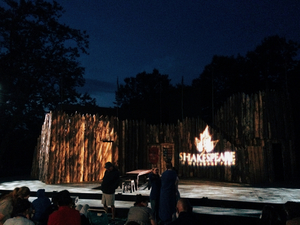BWW Blog: The Mythology of Shakespeare (And Why I Love It)
Shakespeare is built up to be a genius, an unmatched wordsmith whose entire body of work is studied.

"I just don't get it-how a mediocre actor from a measly little town is suddenly the brightest jewel in England's royal crown." Barely ten minutes into the show, Something Rotten manages to sum up exactly how most students feel about William Shakespeare-ambivalent at best and loathful at worst.
The way I look at it, there are two camps that students inevitably fall into. The first, as previously mentioned, is to rebuke the very name Shakespeare, to decry it as old-fashioned and the remnant of a bygone era of study. The second is to wholeheartedly embrace the persona, to worship at the altar of sharp-tongued insults and mournful soliloquies. As a lifelong theater lover and now an English major, I found myself drifting toward the latter option.
In middle school and high school, carrying around my copy of Hamlet or Julius Caesar was my way to indicate that I was through reading Harry Potter and Pretty Little Liars. I was taking on a higher form of reading and thinking, and I was not afraid to show it off, as evidenced by my ever-revolving choice of book in hand. More than that, though, it was a way for me to connect with what I loved. When I was thirteen, I got into Doctor Who. Really into Doctor Who. When I found out that some of my favorite Doctors had done Shakespeare, I started seeking out those plays so I could understand my favorite actors more-the decisions they made while acting, the material they referenced, and how they built up their careers.
Yet, I know plenty of people who groan when they're assigned Shakespeare, and as much as thirteen-year-old Sydney would like to bemoan them as lazy or anti intellectual, they have every right to be sick and tired of the Bard. Was he considered brilliant? Absolutely. So is Quentin Tarantino, though, and I've always found myself inexplicably disinterested with his films. Shakespeare is old-fashioned, that's the nature of a five-hundred-year-old piece of theater, and he occasionally presents extremely outdated ideas. The language is a barrier for some, though if that is the only obstacle that a Shakespeare-hater is facing, I strongly urge them to watch a performance instead of reading it. The language may be antiquated, but human expression and tone is timeless. I never truly understood Macbeth until I saw it at Shakespeare in the Park.
Shakespeare is built up to be a genius, an unmatched wordsmith whose entire body of work is studied. Regardless of whether he deserves this title or not, Shakespeare is our reference point. He's so thoroughly ingrained into our culture that there is no use fighting it now. (Have you ever used the phrase "dead as a doornail" or "wild goose chase"? You have Henry VI and Romeo and Juliet to thank for that.) Besides that, however, it's important that we study where we came from, that "we" being the theatre community, the writing community, or even humanity at large. It gives us a glimpse into the sensibilities and conventions of the past and proves to us that humans will still be-and will always be-humans, no matter which ridiculous outfits they wear or language they speak. The soul of humanity, with all its humor and tears and love and loss (and, yes, the occasional "your mom" joke-thanks, Titus Andronicus) remains intact throughout the centuries. Shakespeare is, above all, hope.
Comments
Videos


